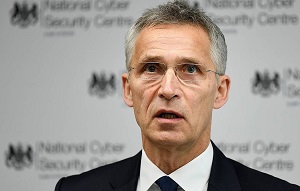BERLIN – Political will is needed to rescue the Intermediate-Range Nuclear Forces Treaty (INF Treaty), NATO Secretary-General Jens Stoltenberg said in an interview with Welt Am Sonntag newspaper published on Sunday.
“There is less and less time left, but it is still not late, the treaty can be saved,” Stoltenberg said. “In 1987 Moscow showed that it can destroy cruise missiles within several weeks,” he noted.
“We are not seeking a new arms race and we don’t want a new Cold War,” the NATO chief said, stressing that the alliance can stand up for itself and pursue a credible and effective policy of intimidating a potential enemy in the world without the INF Treaty, “with a large number of Russian missiles in Europe.”
According to Stoltenberg, NATO’s response to the INF Treaty’s suspension will be well proportioned, coordinated and defensive in nature. These measures could include signing a new arms control treaty or new military responses in the sphere of conventional weapons.
Meanwhile, NATO is not planning to deploy new nuclear weapons in Europe, Stoltenberg emphasized. He once again accused Russia of violating the treaty and called on Moscow to destroy the SSC-8 type missiles (9M729 according to Russian classification).
The NATO chief noted that China is becoming stronger in military terms. “They [the Chinese] are investing more and more money in developing armaments, including nuclear weapons.
Some NATO countries believe it could be advisable to involve China in the new arms control system,” Stoltenberg said. According to him, the new deal could take into account risks linked to introducing artificial intelligence and also threats emerging in the cyber space.
The INF Treaty, signed by the Soviet Union and the United States on December 8, 1987, took effect on June 1, 1988. It applies to deployed and non-deployed ground-based missiles of intermediate range (1,000-5,000 kilometers) and shorter range (500-1,000 kilometers).
Washington on many occasions had accused Russia of violating the accord, but Moscow vehemently dismissed all accusations and, in its turn, expressed grievances over Washington’s non-compliance.
On February 1, US President Donald Trump and US Secretary of State Michael Pompeo announced the suspension of Washington’s obligations under the INF starting February 2. Washington is determined to withdraw from the treaty in six months unless Russia returns to “real and verifiable” compliance. The US insists that Moscow should, first and foremost, eliminate its 9M729 ground-based cruise missile.
On February 2, Russian President Vladimir Putin announced that Moscow was also suspending the agreement. He handed down instructions to refrain from initiating talks with Washington on the issue and stressed that the US needed to show willingness for an equal and substantive dialogue. Putin signed a decree suspending Moscow’s compliance with the Treaty on March 4.
TASS
R.S

